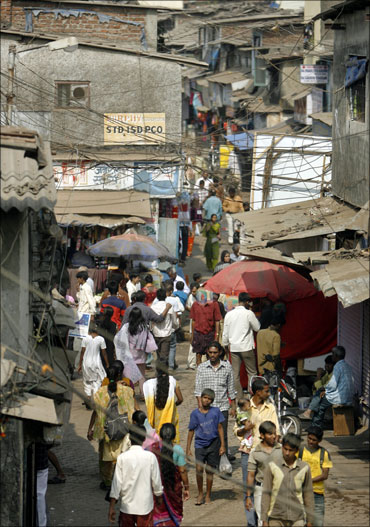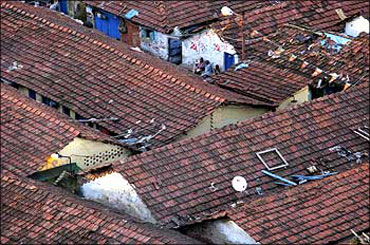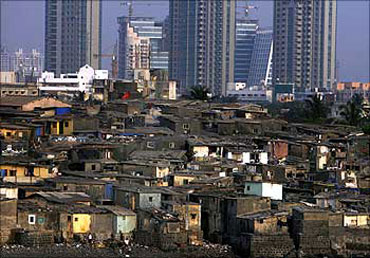Photographs: Reuters Saubhadra Chatterji
Private players may soon be roped in for developing slums under the Manmohan Singh government's ambitious Rajiv Awas Yojna.
An experts committee, headed by HDFC chairman Deepak Parekh, has suggested the Centre encourage private sector participation in implementing the scheme. The Housing and Urban Poverty Alleviation Ministry plans to roll out RAY to make India slum-free in the next five years.
This is a controversial proposal, as non-government organisations (NGOs) are bitterly opposed to the entry of the private sector in slum development, given that land on which slums exist in India has become enormously valuable over the years.
Several state governments have mooted the Public-Private-Partnership (PPP) model for slum development to provide affordable housing through partnership and interest subsidy for the urban poor.
Significantly the Parekh committee does not favour the PPP model. The report said the mode works well when the 'partnership' is clearly defined between the government and the private players.
. . .
How to make India slum-free in 5 years
Photographs: Reuters
"PPP is not a panacea for absolving the public sector of its social and economic responsibilities," the Committee observed. It said that only in some places where land is scarce and prices are high should the PPP model be used.
The committee also does not share the government's dream of making India slum-free in the next five years. It said the target is "unrealistic". The report said: "It (slum-free India) should be projected as a long-term commitment of 20 years, with the first five years representing the first phase of the mission."
The Parekh committee was appointed by the government to look into the draft guidelines of RAY, along with other over-arching projects, and present a report on the scheme. In its 17-page report, Parekh has also suggested that RAY not be undertaken as a stand-alone scheme but made part of the Jawaharlal Nehru National Urban Renewal Mission (JNNURM) "for the simple reason that infrastructure and services form an integral sub-component of JNNURM".
Parekh, who was roped in by the government last year as a firefighter for the beleaguered IT firm, Satyam, has also suggested that funds budgeted under RAY be 'ring fenced'. "Ring fencing such funds will also prevent hasty approvals by the Centre just to ensure that funds allocated under RAY are utilised."
Drawing heavily from various past policy mistakes of the government on land issues and JNNURM failures, the veteran banker has repeatedly asked the government to keep the community at the centre of all planning and management.
. . .
How to make India slum-free in 5 years
Photographs: Reuters
"Under RAY, detailed procedures for community-level participation in drawing up such plans will need to be built in. RAY is about living communities. Any attempt to design for people must be done with people. Any physical plan must ensure that it incorporates living spaces (personal and public)," the report said.
It has also asked the government not to adopt a "one-size fits all approach" for slum development. "Every city has to have a variety of ways to housing the urban poor, suitable to the different parts of the city and its variety of needs. Clearly, a one-size fits all concept cannot work. The role of the community in the preparation of such plans will be core to this activity."
With RAY having different components like slum upgradation, redevelopment, rehabilitation and creation of new housing blocks, the committee has suggested different strategies to be adopted for various components. While it hailed RAY as an "extremely important and a much needed initiative with large economic impacts that are essential for achieving inclusive growth objectives" it has also advised against a pan-India roll out.
"While an all-India coverage of the scheme is laudable, given the scale of the problem, it is prudent for states to adopt a phased mechanism for implementation. It is advisable for the states to begin work in a limited number of cities that can then be extended to other cities after taking into account the lessons learnt," Parekh remarked.
It has also asked for participation of "genuine community-based organisations" to serve as a link between municipalities and poor communities and professional appraisal of projects among other things.





article